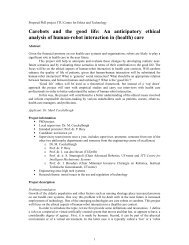Ethical issues in engineering design - 3TU.Centre for Ethics and ...
Ethical issues in engineering design - 3TU.Centre for Ethics and ...
Ethical issues in engineering design - 3TU.Centre for Ethics and ...
You also want an ePaper? Increase the reach of your titles
YUMPU automatically turns print PDFs into web optimized ePapers that Google loves.
<strong>Ethical</strong> <strong>issues</strong> <strong>in</strong> eng<strong>in</strong>eer<strong>in</strong>g <strong>design</strong><br />
load<strong>in</strong>g times. In the case of ro/ro ferries, shipp<strong>in</strong>g companies do not want to<br />
have bulkheads on the decks because it takes time to put them <strong>in</strong> place while<br />
load<strong>in</strong>g the ferry. Moreover, fewer cars can be transported because the bulkheads<br />
have to be <strong>design</strong>ed <strong>in</strong> such a way that larger <strong>and</strong> smaller cars can fit between<br />
them; this requires spac<strong>in</strong>g between the bulkheads that is less efficient if large<br />
cars <strong>and</strong> freight-trucks are considered. So shipp<strong>in</strong>g companies also trade off<br />
safety aga<strong>in</strong>st economic considerations.<br />
F<strong>in</strong>ally, the IMO <strong>and</strong> governments of <strong>in</strong>dividual countries also trade off safety<br />
considerations aga<strong>in</strong>st economic ones. As we saw earlier <strong>for</strong> IMO conventions to<br />
be effective as many countries as possible have to support them. For many<br />
countries, economic considerations will play an important part when it comes to<br />
decid<strong>in</strong>g which safety requirements they consider acceptable. This is re<strong>in</strong><strong>for</strong>ced<br />
by the fact that shipp<strong>in</strong>g companies can choose which flag they sail under.<br />
Governments could <strong>for</strong>bid ships that do not meet their stricter national<br />
regulations from enter<strong>in</strong>g their harbours. There are economic reasons not to do<br />
this. A government’s national harbours, where stricter regulations are en<strong>for</strong>ced,<br />
will have a competitive disadvantage compared to harbours <strong>in</strong> countries that do<br />
not impose stricter regulation than the IMO regulation. This, <strong>in</strong> turn, re<strong>in</strong><strong>for</strong>ces<br />
competition between countries when it comes to devis<strong>in</strong>g attractive rules <strong>for</strong><br />
shipp<strong>in</strong>g companies. Such competition may well water down safety<br />
requirements.<br />
To summarise, some of the important ethical <strong>issues</strong> <strong>in</strong> the case of the Herald of<br />
Free Enterprise are the follow<strong>in</strong>g: the ship’s <strong>design</strong> was <strong>in</strong>herently unstable once<br />
water entered the car deck. Is it ethically justifiable to <strong>design</strong>, produce <strong>and</strong> use<br />
ships that are <strong>in</strong> certa<strong>in</strong> circumstances <strong>in</strong>herently unstable? What is the<br />
responsibility of eng<strong>in</strong>eers <strong>in</strong> this complex situation? There were no warn<strong>in</strong>g<br />
lights on the bridge, there<strong>for</strong>e it was not possible to establish from the bridge<br />
whether the bow doors were closed or not. Should eng<strong>in</strong>eers attempt to anticipate<br />
human errors dur<strong>in</strong>g the <strong>design</strong> process? Is it the responsibility of the eng<strong>in</strong>eers<br />
to <strong>design</strong> <strong>in</strong> a way that prevents human errors as much as possible or even to<br />
<strong>design</strong> idiot proof ships? It is, <strong>for</strong> example, desirable to <strong>design</strong> ferries that cannot<br />
leave port unless the bow doors are fully closed <strong>and</strong> secured. As we have seen <strong>in</strong><br />
sett<strong>in</strong>g the <strong>design</strong> requirements, trade-offs are made between safety <strong>and</strong><br />
economics. There is economic pressure to water down safety requirements. Are<br />
trade-offs between economics <strong>and</strong> safety acceptable? Which of the choices<br />
regard<strong>in</strong>g this trade-off can be justified? Does follow<strong>in</strong>g the regulations lead to<br />
morally acceptable <strong>design</strong>s? <strong>Ethical</strong> <strong>issues</strong> that come up <strong>in</strong> <strong>design</strong> processes like<br />
the ones mentioned above will be central <strong>in</strong> this thesis.<br />
12



